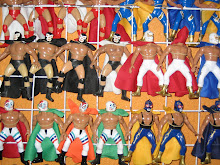 Anything Can Happen in Venezuela
Anything Can Happen in VenezuelaMany Venezuelans have asked me questions about the U.S. elections since my arrival. Those interested wanted to know more about the two candidates and always asked me who I prefer between Obama and McCain. In light of the marked differences between the two candidates that will influence U.S. and Venezuela relations, one professor requested that I present an overview of the election to her class last Wednesday.
I prepared a PowerPoint presentation ahead of time, describing the backgrounds of the candidates and elucidating an abridged version of the Republican and Democratic Party platforms. During my preparation, the thought of self-proclaimed objectivity struck me as hollow at best, yet I strove to present the two candidates in the most balanced way possible. My self-imposed guidelines included: no irate denigrations of either candidate; no condescending remarks; and, no explicitly partisan references in my bibliography (i.e., MoveOn.org, The Family Research Council). More often than not, I cited the New York Times website for reference. I tried my best.
Before beginning the presentation on Wednesday, I asked the class first if they already preferred one candidate over another: thirteen decided, 2 undecided. Thirteen percent of the class electorate still had to choose, compared to four percent of Americans. After the presentation, the professor and I held two classroom wide votes. The first "vote" resembled a publicly held opinion poll, yet it was bound for error due to its primitive design. I asked those in favor of McCain to raise their hands – not a single hand when up. All students raised their hands when I asked who preferred Obama. Suffice it to say, third parties seemed inconsequential, yet a student had told me earlier that anything can happen in Venezuela (e.g., a socialist president rises to power, a businessmen boards a plane with over $100,000 in his briefcase, etc). Therefore, the professor and I decided to cast a secret ballot vote lest the Bradley Effect muddle the true will of the class electorate. We handed out sticky notes as improvised ballots to the students. The result: Obama fourteen, McCain zero, Chavez 1. "Chavez!" I exclaimed as the professor told me the outcome. Chavez – who does not claim much popularity among the English language students at the university – beat McCain in our class election. It later became apparent that the vote for Chavez in our class election turned out to be a joke, which explains why the whole class erupted into laughter. The student who claimed that anything can happen in Venezuela beamed.
Policy Changes to ComeFor those interested, I offer some impressions from my U.S.–Venezuela policy grab bag. Take the differences between candidates with a grain of salt. Between Obama and McCain, the former hints a greater willingness to sit down and negotiate with world leaders that resist or besmirch U.S. foreign policy (i.e., President Hugo Chavez). I’m also told that Chavez tends to berate McCain more often than Obama, so Chavez may be less likely to curse the U.S. executive should the democrats take the country’s highest political office. Yet beyond the Chavez rants, U.S. energy policy of the next administration can shift significantly American and Venezuelan positions on the geopolitical map. Currently petroleum accounts for 80% of Venezuelan export revenues. The country exports much of its hydrocarbons to the United States, and the profits fund a large proportion of the Venezuelan government’s operations. The next U.S. president could change this. If the next commander chief decreases demand for oil imports, then the U.S. will depend less on Venezuela to sate its thirst for oil. And, Hugo Chavez will need another buyer to whom he can sell Venezuelan oil, though the specifics are still beyond my knowledge. Regardless, the next president will shape U.S. energy policy and demand for imported oil, which will shape the course of Venezuela´s economy and government without a doubt.

 Mery, Albelk and me before Obama won.
Mery, Albelk and me before Obama won.



 Anything Can Happen in Venezuela
Anything Can Happen in Venezuela

